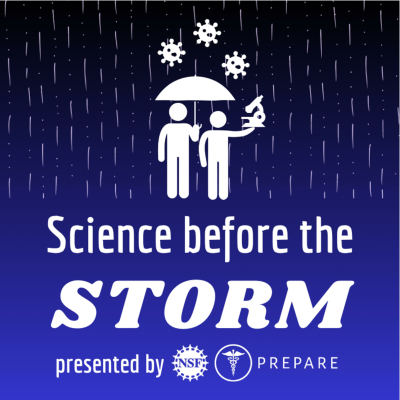
NSF PREPARE: Science Before the Storm
English
Technology & science
Limited Offer
2 months for 19 kr.
Then 99 kr. / monthCancel anytime.
- 20 hours of audiobooks / month
- Podcasts only on Podimo
- All free podcasts
About NSF PREPARE: Science Before the Storm
When we speak of the next pandemic, it's no longer a question of "if" but "when". The NSF research community is uniquely placed to ensure that multidisciplinary and cutting-edge science is applied to real-time real-world situations. Join us as we talk to the scientists at the heart of these innovations - and through our special "researcher match" episodes, we spark new ideas and collaborations among researchers. This is Science before the Storm. This is based upon work supported by NSF Grant No. CNS-2041952. For more info, visit https://prepare-vo.org/ and https://twitter.com/NSF_PREPARE
All episodes
12 episodesRevolutionizing Medical Research: Exploring the Potential of Organ-on-a-Chip Technology
In this captivating episode, we have the pleasure of meeting Dr. Abhinav Bhushan from the Illinois Institute of Technology. Dr. Bhushan shares his journey and passion for his work in microfabrication and microfluidics, with which he considers himself fortunate to be involved. Dr. Bhushan is at the forefront of developing innovative solutions, such as organ-on-a-chip technology, particularly in the context of exhaled breath analysis. He also sheds light on the discrepancies between cell and human studies and discusses the potential of organs-on-a-chip for clinical translational research. Tune in to gain valuable insights into the fascinating world of microfabrication, microfluidics, and their applications in biomedical research and diagnostics. Learn more about his RAPID grant [https://www.youtube.com/watch?v=Hj8srnFCSo8&list=PLVFmEa7novObS_dZNrMaG-hGjsGFxJMsR&index=6&t=62s.]: https://www.youtube.com/watch?v=Hj8srnFCSo8&list=PLVFmEa7novObS_dZNrMaG-hGjsGFxJMsR&index=6&t=62s Abhinav Bhushan is an Assistant Professor in Biomedical Engineering at Illinois Institute of Technology. He is interested in using microfluidics and microfabrication to engineer tissues as well as to develop sensors for chemical and biochemical measurements. He uses these tools to better understand diseases, in particular inflammation and metabolic diseases. Learn more [https://sites.google.com/iit.edu/bhushan-research-group]: https://sites.google.com/iit.edu/bhushan-research-group
Unlock Your Superpower: How Looking for Four-Leaf Clovers Can Reveal the Potential of Non-Coding RNA
In this inspiring episode, we sit down with Dr. Glen Borchert from the University of South Alabama. Dr. Borchert shares his journey of growing up in a small town and finding his place in the world of research. Dr. Borchert also shares his approach to research, which involves searching for what doesn't fit the established framework of understanding in a particular field and studying the unexamined. He discusses his interest in non-coding RNA and how this area of study has the potential to revolutionize our understanding of gene regulation. Furthermore, Dr. Borchert emphasizes the need for antiviral development to prepare us for the next pandemic and shares insights on how his research can contribute to this effort. Tune in to gain inspiration and insight into the world of research and academia, and to learn about the potential of non-coding RNA in preparing for future pandemics. Learn more [https://www.youtube.com/watch?v=Hj8srnFCSo8&list=PLVFmEa7novObS_dZNrMaG-hGjsGFxJMsR&index=6&t=2257s ]: https://www.youtube.com/watch?v=Hj8srnFCSo8&list=PLVFmEa7novObS_dZNrMaG-hGjsGFxJMsR&index=6&t=2257s Glen Borchert is an Assistant Professor in Biology and Pharmacology at the University of South Alabama. He originally received a B.S. in Biology from the University of Tennessee and then completed a Ph.D. in Genetics from the University of Iowa. Dr. Borchert’s research focuses largely on identifying novel genetic regulators and defining their roles in oncogenesis, microbiology, and speciation. Since starting his laboratory at South Alabama in August 2012, Dr. Borchert has published dozens of papers in peer-reviewed journals and had numerous grant applications funded including a highly prestigious NSF CAREER award (2014-2019). Learn more [https://www.southalabama.edu/biology/borchertlab/index.html]: https://www.southalabama.edu/biology/borchertlab/index.html
Microbial Muses: Finding Inspiration for Student Reading and Research through Microbiology
In this inspiring episode, we sit down with Dr. Davida Smyth from Texas A&M, San Antonio, who shares her journey as a first-generation university student from Ireland to the United States. Dr. Smyth talks about how getting to see bodily fluids in the clinical lab inspired her to pursue a career in science. She also stresses the importance of taking advantage of opportunities, approaching your professors, building classes around students' needs, and making science relevant. Tune in to hear Dr. Smyth's story and gain insight into how you can navigate your own path in the world of academia...or not. It’s up to you. Davida Smyth is an Associate Professor in the Department of Life Sciences at Texas A&M, San Antonio. She developed several new courses that involve undergraduates in research and incorporate civic engagement and social justice into the curriculum. She is devoted to undergraduate research and her students have presented their work at several national and international meetings. With her undergraduate team, she researches the role of the built environment [http://davidasmyth.net/] and anthropogenic activity in driving antibiotic resistance, a major global health threat. She also engages in pedagogical research on improving civic and scientific literacy [http://readingeffectively.net/] in biology and integrating authentic research into the curriculum to improve student engagement and success in science. Dr. Smyth also guides and mentors future faculty and adjuncts to successfully apply for academic positions in teaching and beyond. Since 2014, she has been involved with SENCER [http://sencer.net/] (Science Education for New Civic Engagements and Responsibilities) and was appointed a SENCER Senior Leadership Fellow in 2018. Learn more [https://apps.tamusa.edu/course-information/Profile/Faculty/583?=Davida-Smyth]: https://apps.tamusa.edu/course-information/Profile/Faculty/583?=Davida-Smyth
Bridging the Gap: Equity and Access in STEM Education and Beyond
In this thought-provoking episode, we sit down with Dr. Trina Fletcher from Florida International University. Dr. Fletcher shares her story of finding her place in engineering and computing education and using her platform to advocate for those who may not have a voice. She discusses the importance of increasing diversity, equity, and inclusion in academia and industry and shares insights on how to make this a reality. Through her experiences, Dr. Fletcher has learned valuable lessons on how to make a positive impact and inspire change. Tune in to gain insight and inspiration from her journey. Trina Fletcher is an Assistant Professor of Engineering Education at Florida International University. She has an interdisciplinary background with both her education and full-time experiences. Fletcher holds a doctorate in engineering education from Purdue University and has industry experience including roles with Johnson & Johnson, and Eaton Corporation and serving as the director of pre-college initiatives for the National Society of Black Engineers (NSBE). Learn more [https://www.trinafletcher.com/]: https://www.trinafletcher.com/
Juggling Multiple Roles: Moonlighting Proteins and the Scientists Who Study Them
In this fascinating episode, we sit down with Dr. Constance ("Connie") Jeffery from the University of Illinois at Chicago. Dr. Jeffery shares how she discovered moonlighting proteins, a field of study that has become her research focus. She also discusses her innovative response to the pandemic by creating an online, virtual summer undergraduate research and mentoring program (MSFP 2021 [http://jefferylabuic.weebly.com/]) to serve students during a time of upheaval and uncertainty. She shares insights on how to provide meaningful research experiences to students in a remote environment and how this program has impacted the lives of those involved. Learn more [http://jefferylabuic.weebly.com/]: http://jefferylabuic.weebly.com/ Tune in to gain a deeper understanding of moonlighting proteins and how they function, as well as to hear about the importance of providing research opportunities to undergraduate students, particularly during challenging times. Learn more [https://www.youtube.com/watch?v=Hj8srnFCSo8&list=PLVFmEa7novObS_dZNrMaG-hGjsGFxJMsR&index=6&t=967s]: https://www.youtube.com/watch?v=Hj8srnFCSo8&list=PLVFmEa7novObS_dZNrMaG-hGjsGFxJMsR&index=6&t=967s Connie Jeffery is an Associate Professor in the Department of Biological Sciences at the University of Illinois, Chicago. She uses biochemistry, biophysics (X-ray crystallography), and bioinformatics to understand how protein sequences and structures relate to their functions. Her current research topics include moonlighting proteins, pseudoenzymes, metamorphic proteins, and proteins involved in cancer and IBD. Studies of individual proteins involve combinations of X-ray crystallography, ligand binding assays, catalytic activity assays, mutagenesis, and/or computer-based ligand docking simulations or analysis of disease-causing genetic mutations. Additional computer-based projects in the analysis of protein sequence, structure, and function are being performed to develop better methods to predict a protein's function(s) from its sequence or structure. Learn more [http://jefferylabuic.weebly.com/jeffery-lab-home.html]: http://jefferylabuic.weebly.com/jeffery-lab-home.html
Choose your subscription
Limited Offer
Premium
20 hours of audiobooks
Podcasts only on Podimo
All free podcasts
Cancel anytime
2 months for 19 kr.
Then 99 kr. / month
Premium Plus
Unlimited audiobooks
Podcasts only on Podimo
All free podcasts
Cancel anytime
Start 7 days free trial
Then 129 kr. / month
2 months for 19 kr. Then 99 kr. / month. Cancel anytime.





































